Comic-Con: “Spotlight on Allie Brosh” (Or, My Favorite Panel)
There was one panel that I [sort of] “camped out” for at SDCC this year, and that was Saturday’s “Spotlight on Allie Brosh”.
It was a 1:30 PM panel and I was in the room around 11:30 AM, which I don’t regret at all for several reasons – first, the two panels I sat through beforehand were actually pretty good; second, by arriving so early I was actually able to nab a seat in the second row (between the 11:30 and 12:30 panels, actually); third, the Allie Brosh panel itself – which was moderated by Felicia Day – was absolutely amazing.
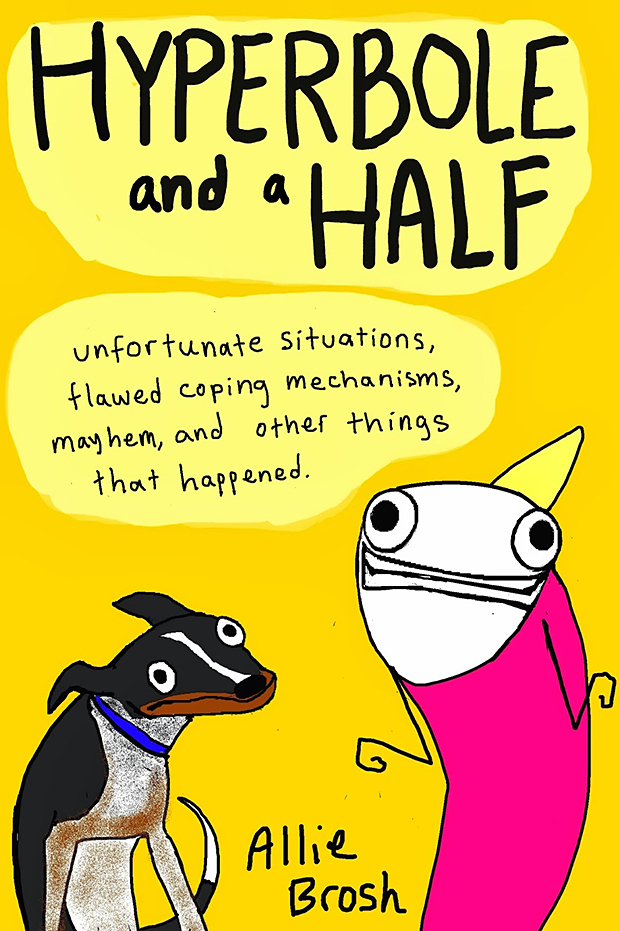 In case her name doesn’t ring a bell, Allie is the amazing woman behind the near-infamous blog Hyperbole and a Half, which is now a book, as well. On top of that, she’s releasing her second book, Solutions and Other Problems, in October. I would have been excited for it before this panel, but afterward, well, that excitement is multiplied ten-fold.
In case her name doesn’t ring a bell, Allie is the amazing woman behind the near-infamous blog Hyperbole and a Half, which is now a book, as well. On top of that, she’s releasing her second book, Solutions and Other Problems, in October. I would have been excited for it before this panel, but afterward, well, that excitement is multiplied ten-fold.
I did take an audio recording of the panel, but unfortunately the first 15-20 minutes was quite garbled…and even later, there were large portions that were difficult to hear (yes, even despite my second-row seat and a halfway decent recorder – let’s just say there was a LOT of [positive] audience reaction). Therefore this article is going to be part recap and part transcript, but thankfully, most of the best parts were salvageable…so I’ll just dive right in!
*Please note that in the transcript portions of this article, I did cut out some of their more conversational bits both because they were difficult to hear at times, as already mentioned, and also in an attempt to keep this article to a more reasonable length.*
Felicia began by asking Allie to talk a bit about her childhood, mainly because she has shared several stories from it on her blog and in her first book. Allie talked about how she lived in a house full of family – her parents, her sister, her grandmother, and her aunt – and that she would gather them around and insist that she needed to tell them a story “Right now!” Apparently most of these stories featured, of all characters, Rudolph the Red-Nosed Reindeer. All of these stories began the same way – “It was a dark and stormy night” – and Allie would “pause for an uncomfortably long time” before continuing.
Although she doesn’t really remember any of the exact stories, she does know that they were “filled with strife” – she took the idea of Rudolph being rejected by the other reindeer and ran with it. He would have diseases, or his parents would die. She went “down the list of family members, and Rudolph didn’t have any family left…didn’t have any toys…” The stories would describe Rudolph’s awful life, and she didn’t get that ending them on a happy note was the point and would instead focus on the misery. At one point she explained, “I would cast other toys in the role of Rudolph…and they were mostly dinosaurs…it would be like a brontosaurus, and that would be Rudolph…if you think about the character though, brontosaurus is sort of like Rudolph, he was kicked out for a really long time.”
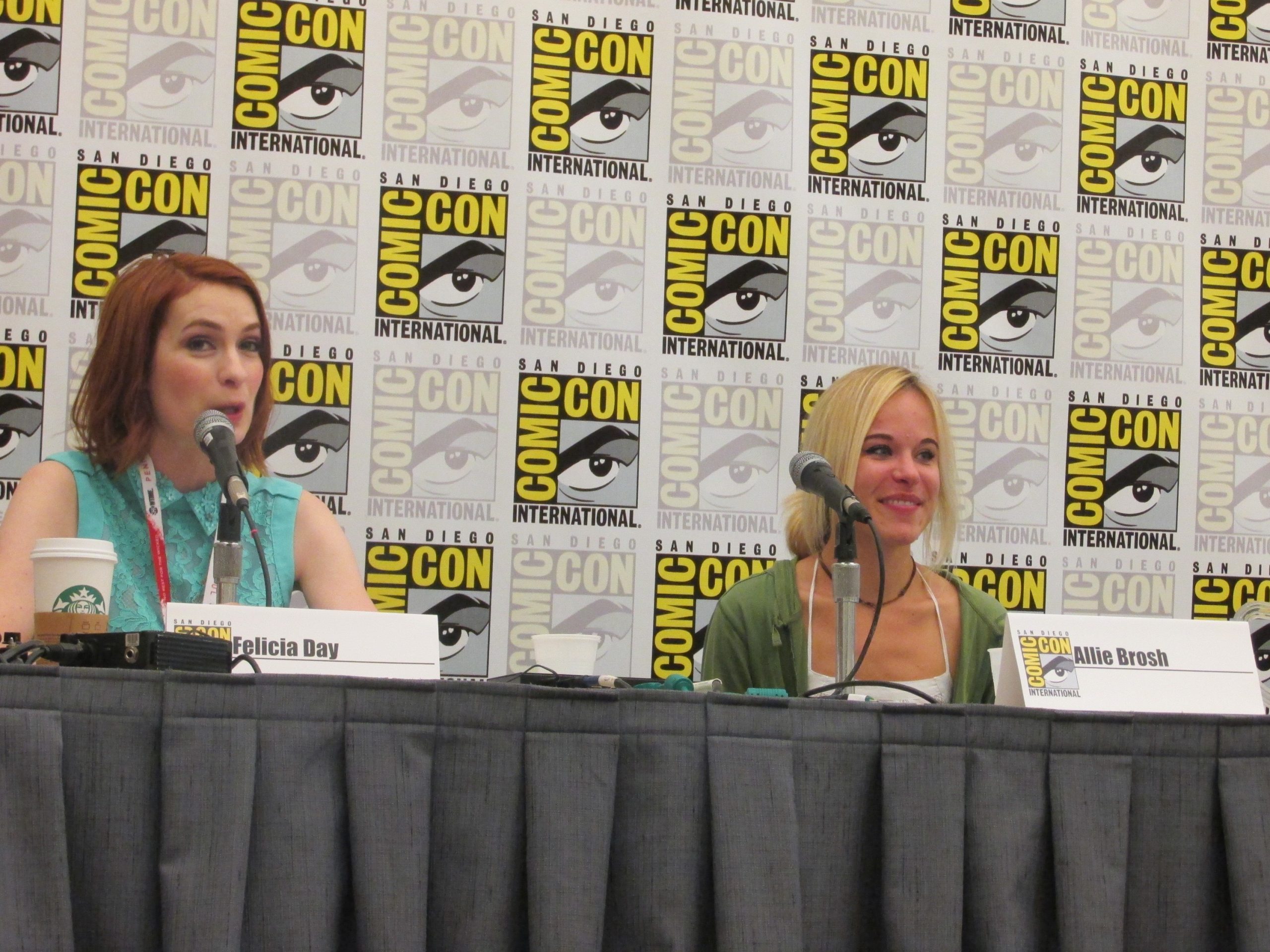 Felicia’s reply was, “He was! he was decommissioned like Pluto! But now he’s back, right?” Which led to a very interesting conversation about dinosaurs and Pluto and science that ended with one hell of an amazing quote from Allie: “If you think about it…Rudolph is like…it’s okay to be different, as long as you’re useful…There are so many stories…like the Ugly Duckling…you can be ugly, as long as it’s not forever!”
Felicia’s reply was, “He was! he was decommissioned like Pluto! But now he’s back, right?” Which led to a very interesting conversation about dinosaurs and Pluto and science that ended with one hell of an amazing quote from Allie: “If you think about it…Rudolph is like…it’s okay to be different, as long as you’re useful…There are so many stories…like the Ugly Duckling…you can be ugly, as long as it’s not forever!”
One random question that came up during this time was whether or not Allie draws on tablecloths at restaurants when allowed. At this point she mentioned that she’d eaten at Dick’s Last Resort since arriving in San Diego, and Felicia was surprised. “As a tender soul,” she said, “I wouldn’t want you to go there”…but Allie apparently really enjoyed it. This was the first of many moments during the panel where they proved to be near polar opposites, leading to Felicia eventually announcing, “We could have a sitcom.” YES PLEASE, I WOULD WATCH. (And judging by the audience’s reaction, so would many others.)
FELICIA: How did you develop a creative process?
ALLIE: I think I developed it just by developing it, if that makes sense? Whatever worked out…I’m not a…very regimented type person, and a lot of my process has to do with circumventing myself…there’s a lot of leaving notebooks around, to find…I try to make it as fun for myself as possible. The idea farm…it’s play, for me…
…See, I have not met so many deadlines in my life, it’s almost like it has, I don’t know, I’ve grown a tolerance to it. It’s a problem that I get…less stressed…it’s happened so many times I’m just like, yeah, what’s failing again?
F: But do you think that…having the deadline, does that push you to concentrate your creativity a little bit more?
A: It does…like deadlines…I still know that it’s [sic] there, but…motivating myself is a difficult thing…maybe it’s because I get so stressed out by deadlines that my brain just shuts down…the detachment, it’s like you reach a point of psychological uncertainty and anxiety, and your brain just says ‘no, no, you’re not going to do this anymore. We’re shutting you off.’
 F: In your creative process…what comes first?
F: In your creative process…what comes first?
A: It’s different every time. Sometimes I’ll sit down and think about things I’ve seen or heard or thought about lately…I like trying to combine things…I’ll go through the idea farm and…try to find ways to push myself out of ways that I normally think.
F: It’s almost like…creativity is connected to things that surprise you.
A: Creativity feels like a process of discovering inspiration, and I don’t know what’s going to happen. And I really like that…creativity is really fun…the structuring part is less fun.
F: How [did] you branch out and find your own voice, as an artist?
A: It definitely was an evolution. I look back at my earlier drawings, and they don’t resemble what I have now at all…a lot of my creative process is…I start putting down lines. Whether they’re written lines, drawing lines…I put things down on a page and just see what they look like, and see where I can go from there.
F: How do you know that’s your voice? How do you know when to stop, right? It’s almost like, when do you stop rewriting, how do you be like, oh, this is a style I like, I want to do it, like, a hundred times? Is it just a gut feeling?
A: I definitely have gut feelings about things. I know that in my head always some very specific things…it’s difficult because I can’t see it clearly, it’s more of a…I could do it better in sounds and some sort of weird movement.”
At this point the conversation turned to the fact that Allie has synesthesia, a neurological phenomenon in which stimulation of one sensory or cognitive pathway leads to automatic, involuntary experiences in a second sensory or cognitive pathway. She didn’t know what it was or that she had it until she was 22, and for her it means that letters, music, etc. are colored. For example, her alphabet has been the same for as long as she can remember – ‘A’ is red, ‘B’ is light green, ‘C’ is a weirdish brownish-red, and ‘D’ is brown…and on and on. This led to Felicia calling her a mage, which got quite a laugh from the audience.
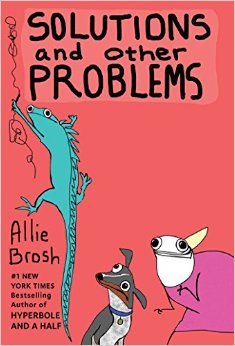 FELICIA: Why would you describe your work as ‘stand-up comedy in book form’?
FELICIA: Why would you describe your work as ‘stand-up comedy in book form’?
ALLIE: I watch a lot of stand-up comedy…and I always sort of wanted to do it…I wasn’t brave enough…It was something that I really wanted to do…I love the art form…so when I started trying to create comedy, I found myself getting very frustrated with the lack of visual representation in writing. And drawing…was sort of the perfect solution to that…I feel like drawing is sort of a crutch to make up for what I lack in writing.
F: How is it different writing in [blog] format versus a book, and how do you have the mental fortitude to write a whole book?
A: It started out as just a…thing that I liked to do. I was just procrastinating on studying for a physics final…for me, the best way to get myself to do anything is to have to do a different thing. It’s…I automatically want to do anything that isn’t the thing I need to do…I’m halfway through a screenplay right now because I have to write a book. I’m very productive as long as it’s not the thing I need to do…So that’s how my blog started…I needed to do this other thing…I think I typed in ‘free blog’ to Google and Blogger came up.
F: So how did you go through the process of taking those snippets and wanting to turn them into a book, and how do you deal with that artistically?
A: It was very difficult at first, and when it started to feel like there were deadlines or things that made it feel like work rather than just this fun thing that I was doing, that was a very difficult period in my life…I’m in awe of people who can stick to schedules…I try to figure out how to…take this thing that was starting to feel like work and inject more freedom into it.
F: Obviously you’re a gamer, was that something you grew up with or did it just happen?
A: It’s mostly been Magic. I started playing Magic when I was ten, maybe…I had these three friends and they were all into it, and they sort of adopted me into their group later…they were all friends before I joined the group, and they started playing Magic. And then I don’t know what it was…one day they were just like, ‘hey, you should come be part of us.’ And I kind of found acceptance…Magic was part of that. It was the way we bonded after school.
F: So did that turn into board games as you grew up, or is that something you got into now, or is that video games?
A: I never actually learned to play video games.
F: I can help you with that.
A: I’ve played Portal and Fallout 3, and I love both of them.
F: …There’s a temperature of capability, almost like you have to be an Olympian of gaming to even say you’re a gamer, which is kind of…an old-fashioned ideal. Especially since people have so many different games, and really, people who never thought they were a gamer every day play games on their iPhones, and I’m hoping that changes, so I’m going to call you a gamer.
F: Your book is very unusual in that it is a memoir, it’s humor, it’s graphic novel…so if you were going to put it in a store…where would you want it, in those categories?
A: Probably humor.
F: With Dave Barry?
A: I love Dave Barry.
F: I read all his books when I was growing up.
A: Me too!
F: He’s so folksy!
A: It was like, him and Calvin & Hobbes…My parents had Dave Barry as…bathroom reading.
F: He was like a hot dad.
A: I don’t know, I think this was before hot informed as a concept in my head.
F: You didn’t ever want to just marry a guy like, off the TV?
A: That instinct took a really long time to kick in for me, and it kicked in at a really unfortunate point in my life as well…my best friend had just dared me to shave my head bald.
F: Wait, how old were you?
A: Thirteen.
F: And you did it?
A: I did. Because I didn’t think I had anything to lose.
F: So who was your first celebrity crush?
A: This is embarrassing…Rick Moranis.
F: When you’re not writing, who do you like to [read], and when you’re getting ready to write, who inspires you?
A: So recently I’ve been reading Hunter S. Thompson…I have a hard time going to sleep…when I’m writing a lot my brain just starts going a lot…I can’t bridge very easily from that to sleep…so Hunter S. Thompson is actually a very nice transition…between writing and bedtime. So lately Hunter S. Thompson…I know I’m a big Douglas Adams fan…
F: How do you reconstruct events from your [past] in a way that is fresh…What do you do to get back there to those memories…do you have a process for recovering things that you didn’t know you remembered?
A: For the uncovering part, I look through like old family photo albums and stuff, and I talk to my mom a lot. I actually recently just hired her as my first ever employee.
F: That’s so much power!
A: So I get to be around her a lot more now…so she’ll come over, and I ask her…’Can you remember any weird things that I did?’…’Oh yeah.’
F: There are a lot of the things that touched me the most in your writing, about anxiety and depression…can you talk a little bit about that process, and how do you objectify such emotions that [are] not objective…does that make sense?
A: I think it does.
F: It’s impossible to be objective when you are anxious or depressed, but you are able to convey it in a way that you feel very self-aware and you’re putting together the pieces in a way that makes it very relatable and…like you understand yourself.”
A: I think it comes from…I’m always trying to solve everything, and trying to figure out how it works, and see what happens, that sort of thing. So what happened, when I was depressed…my immediate reaction was to try to fix it. To go in and be like, how does this work…I don’t care how much I have to think about it, I’m going to find a thing that solves it…I haven’t found the actual solution yet, but the process of trying to find it was important for…being a motivator for thinking about it a lot…I always feel very compelled to, for some reason, be understood…I want to just reach out and touch something in the void and be like, this is something I’m going through…I’m really alone, and if I can describe it or if I can say something…maybe somebody else knows the solution, maybe somebody else will be able to give me the information that I need to fix this.
F: Well that’s what an artist does – an artist invites you to see the world as they see it…You are able to put humor in the darkest situations…Is that like…because you’ve gone through the journey…you can’t be ruthless, too ruthless with yourself?
A: I think it’s just…it started out as a coping mechanism…it does put a little bit of distance between me and the…it acts as a vehicle for a little bit of detachment itself…it creates a little more objectivity on the scale…it slides a little bit more toward the objective, I guess…It’s a coping mechanism…that I use to get through life. If I can laugh at it or you know, remove myself from it a little bit, say, ‘I’m not in this place so much, I’m not wallowing’…it gives me a feeling of power over it if I can sit there and laugh at it…
F: If you could have dinner with three different comedians, who would they be?
A: Well Louis CK would definitely be one of them…maybe Dave Barry…does Rick Moranis count as a comedian?
F: Let’s talk a little bit about your…new book. It’s coming out in October…What was your experience in doing another book, why did you say ‘Yes I want to do another book’?
A: Actually I really enjoyed writing the first one…books, to me, it feels like…I like writing online for different reasons than I liked writing a book…books feel like a more natural format for me…because I can write about a lot of things, sort of spread my attention around…it feels a lot more like playing…and so, yeah, I love writing books, and so this one was just a no-brainer…like, absolutely I’ll write another book. And it’s been different from the first one because this one is all new material. The first one had like ten old, previously published stories, and ten new ones. And this one has…I’m not done with it yet, but between eighteen and twenty-one new things, and so it’s been…different trying to do…all of that stuff at once.
F: It’s very hard…online…you have the impulse to share every moment that’s fun with the audience. It’s very hard to…horde up the creativity and let it bubble into something bigger. So…in writing a second book with all-new material that you haven’t shared with the audience, is it restrictive in any way, or is it exciting that you get to horde it and show it all at once? How do you balance that…how do you maintain keeping your online presence up at the same time as writing a book?
A: Well I…I’ve sort of not kept up my online presence…I tend to…I have a strange relationship with attention…I crave approval, but at the same time…so I thought…when I got into this, with writing…it would be this great thing where I get all this attention, but then once it was more on me I was like, ‘oh no no no’.
For the last portion of the panel they moved on to an audience Q&A, and there were some really great questions, although there was only time for a handful of them. Probably the most ‘important’ question for her long-time fans was whether there was any hope for her blog – and though she admitted that she may not start posting in it regularly any time soon, she also promised that she wasn’t going to give it up entirely, which was good to hear. One person asked what it was like for her to write her posts about depression, and Allie said that it was terrifying. She didn’t show the first blog entry to anyone before posting it, which she normally does, so she had no idea if it would be relatable, or if her experience was something people would connect with.
Another audience member asked if Allie had tried out any other styles of drawing before settling for her very simplistic one, and she said that she loved drawing and had been doing it most of her life. When she was younger she entered contests and even won some of them, and apparently she drew mostly wolves – “just wolves doing things…this wolf is here, that wolf is behind a tree…maybe they are friends”. She also drew dragons sometimes, and once in a while, wolves and dragons together. (At this point I really wanted to ask if she’d read the Song of Ice & Fire series, for obvious reasons.)
The last audience question wasn’t actually a question but rather a woman standing up and admitting that while she’d been a long time fan of Allie’s blog and related to a lot of her earlier posts, she didn’t relate to her posts about depression – but that reading them helped her understand and connect with her daughter, who does suffer from depression. The woman speaking got choked up, I got choked up, and Allie herself actually started crying. Speaking from experience (as someone who has written blog entries – albeit much less interesting ones – about my own battles with depression and anxiety), I know how uplifting it can be to know that this terrifying thing you did has helped others, but how it can also be difficult to hear that others have struggled with the same things. Felicia had called Allie a “tender soul” earlier in the panel, and yes, she is – but she’s also clearly tough as nails, smart, and funny. I can only hope to see more of her at future conventions – or at least see more of her, period, online or otherwise, as she finishes and promotes her second book.
Author: Tara Lynne
Tara Lynne is an author, fandom and geek culture expert, and public speaker. She founded Ice & Fire Con, the first ever Game of Thrones convention in the US, and now runs its parent company Saga Event Planning.
Help support independent journalism. Subscribe to our Patreon.
Copyright © The Geekiary
Do not copy our content in whole to other websites. If you are reading this anywhere besides TheGeekiary.com, it has been stolen.Read our

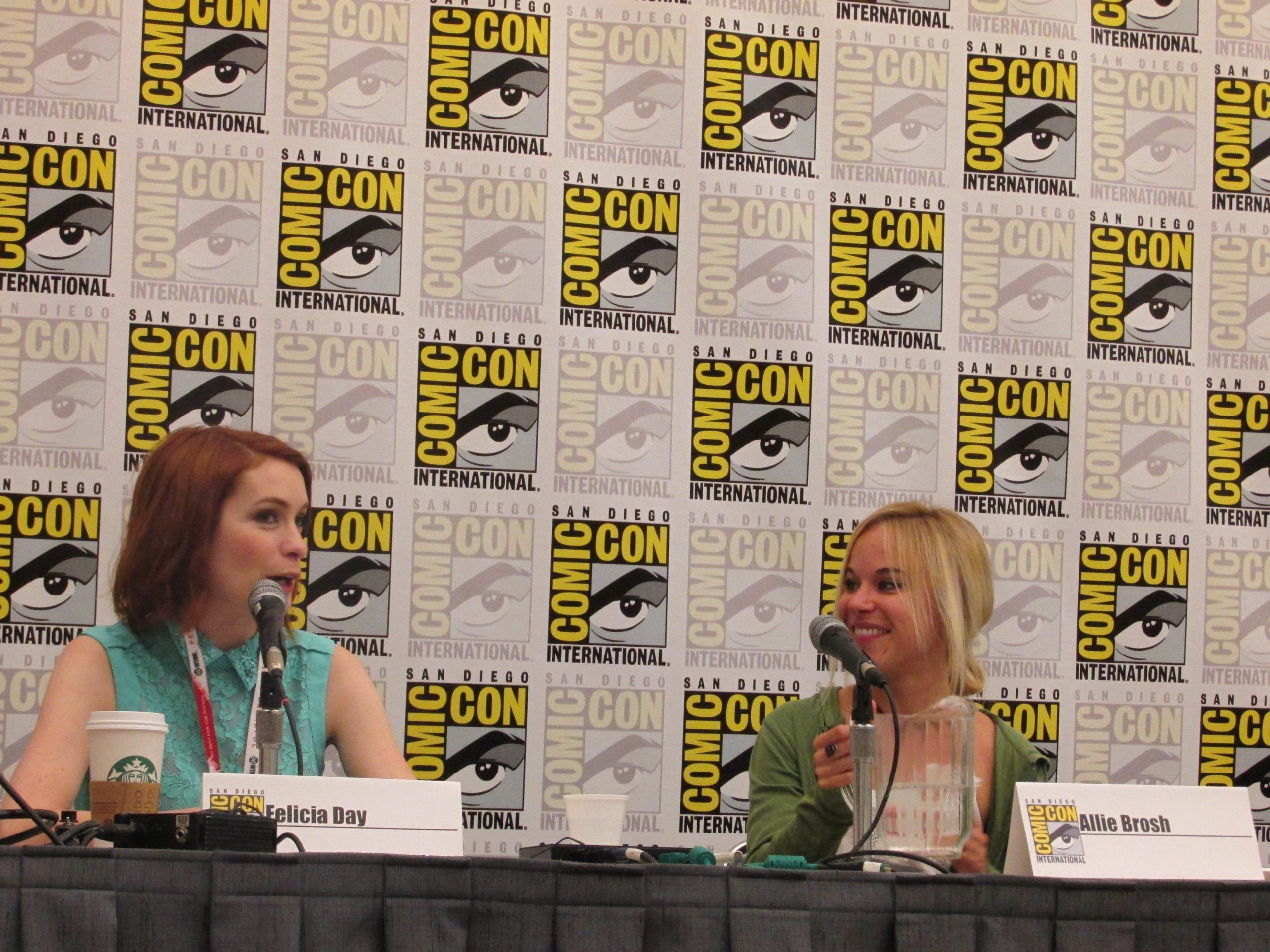
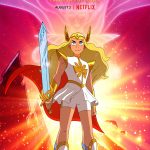
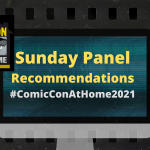


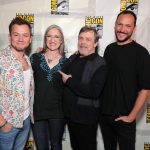
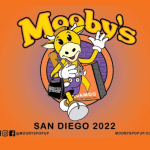
Thanks so much for this! She seems to be doing well, which is great, and the thought of her new book feels like the most exciting thing of the year. Maybe she’ll just keep writing more books!
Oh the pleasure was all mine! Seeing her speak was an awesome experience and I’m so glad I was able to share it with others via this article 🙂 And yeah I hope she keeps writing more books as well!